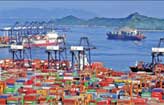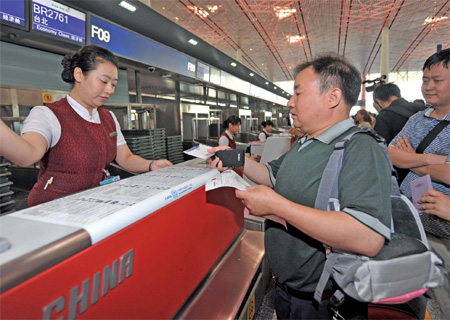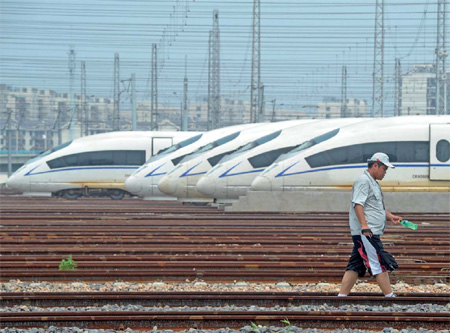Just the ticket for travelers?
Updated: 2011-08-26 11:55
By Wang Ying (China Daily)
Competition between rail operators and air carriers intensifies
|
|
In an eventful month since the highly publicized opening of the high-speed rail link between Beijing and Shanghai, airline companies are still trying to figure out what impact the service will have on their income from the busiest and most profitable domestic route.
To complicate matters, most of their earlier projections have been thrown into confusion by the fatal accident at Wenzhou, Zhejiang province, on July 23, when two bullet trains collided, in which 40 people died and more than 190 were injured.
The accident has shaken commuter confidence in the safety of the new rail network. Airline executives in Shanghai said that their strategies have been put on hold because it is hard to predict when confidence in the railway will return.
Originally, the traveling time between the two by high-speed rail was between 5 and 6 hours for a distance of 1,070 kilometers, compared with two and a half hours by air. However, in the wake of the Wenzhou crash, the government has ordered the trains to reduce speed, thus increasing the journey time.
The initial reaction of the airlines serving the route - mainly Air China Ltd, China Eastern Airlines Co Ltd and its subsidiary, Shanghai Airlines - has been to push prices back to levels last seen in the days before the high-speed rail link existed, around 1,130 yuan (123 euros) for a one-way ticket.
Since the Wenzhou accident, which was not on the Beijing-Shanghai route, many of the discounts offered on flights between the cities have all but evaporated as passengers have flocked back to air travel.
There were plenty of discounted air tickets in early July. The lowest price for a flight between Beijing and Shanghai fell to a mere 410 yuan one way, while the most expensive came in at 1,750 yuan.
However, the impact was short lived as airline occupancy rates gradually returned to as high as 90 percent in the fourth week of July, and the percentage of full-price tickets sold also grew steadily, according to reports in the Beijing News.
Transportation researchers now hold the view that over the long term, the projected increase in passenger traffic will ensure the profitability of both the high-speed rail link and the airlines. However, airline companies are not about to ignore the competition.
|
|
"In the first week the Beijing Shanghai high-speed railway was officially put into use, the occupancy rate of China Eastern's flights between Beijing and Shanghai fell by 20 percent," says Luo Zhuping, board secretary of China Eastern Airlines.
Meanwhile, although the airlines' occupancy rates failed to reach the peak seen in July 2010 - when numbers were boosted by the tourism boom that accompanied the Shanghai World Expo - up to 90 percent of the seats were occupied this year, as the July summer vacation period is traditionally a busy month for air carriers, adds Luo.
According to the Ministry of Railways (MOR), during its first month of use the Beijing Shanghai high-speed link carried 5.26 million passengers, or 170,000 each day.
A daily average of 254,000 passengers traveled between Beijing and Shanghai by rail (both regular and high-speed services) in July, a rise of 58.8 percent from June, said the ministry.
The competition between railways and civil aviation is set to grow fiercer as four vertical (north to south) and four horizontal (east to west) railway networks are currently under construction, aiming to serve the nation's most prosperous and populous areas.
"The flight between Beijing and Shanghai is most affected by the Beijing-Shanghai high-speed railway," said He Li, vice-president of Air China, at an aviation forum in July.
Air China and China Eastern dominate the Beijing-Shanghai air route. Their combined market share exceeds 90 percent, leaving less than 10 percent for China Southern Airlines Co Ltd and Hainan Airlines Co Ltd to fight over, according to Li Lei, an industrial analyst from CITIC China Securities Co Ltd.
Li says the ticket price of the high-speed railway is lower than that of airlines, which means that some passengers will always elect to travel by train.
However, in the long run, the railways and air carriers will strike a balance and register organic growth, because of their respective strengths and weaknesses, he adds.
Currently, the high-speed train is attracting travelers because of its lower prices and better levels of punctuality, while the aviation companies are maintaining their customer base because of the convenience of the mode of transport.
"I have tried both the plane and high-speed train before and I prefer to take the high-speed railway," says Wang Chuan, a director of a public relations management company, who travels between Beijing and Shanghai once a fortnight.
"The high-speed railway offers a higher frequency of trains, which fits my schedule better. It helps me to manage my time more efficiently," she says.
Wang adds she also prefers to take the train because, unlike air travel, there is no need to book a ticket in advance, and be-cause flights are often delayed.
The punctuality rate of flights is poor: Statistics from the Civil Aviation Administration of China-show only 77.2 percent of flights arrived on schedule in 2010, thus extending the passengers' actual traveling.
Moreover, the high cost of high-speed rail construction won't always mean expensive tickets. Once the cost of high-speed train travel falls, more long-distance flights (greater than 1,000 km) will be challenged by the rail network.
Lu Yu, a student at Shanghai's Fudan University, says she prefers air travel.
"As long as I can buy the tickets at a discount, the cost of an air-plane ticket is almost the same as a high-speed rail-way ticket," she says.
Lu comes from Beijing, and travels between the two cities twice every semester.
"The railways have recently been the subject of public criticism for their poor service and frequent interruptions, so people tend to prefer planes," says a government advisor, who spoke on condition of anonymity.
The Ministry of Railways has put so many newly constructed routes into use over such a short period of time, that the punctuality rate for rail travel will definitely be affected by teething troubles, says Li.
According to Li, this negative influence will last for one or two years, which will provide a competitive advantage for civil aviation.
Wang Ying, a 39-year-old manager of an operational department at a multinational corporation, says she decided to choose the plane after the recent bullet-train accident.
That accident will obviously take some gloss off the new high-speed net-work as doubts are cast of its safety and punctuality. But Li believes that, once the technical hurdles are ironed out, the service will hold several advantages over the plane, including lower prices and reduced waiting times.
Experts said that al-though competition between the railways and civil aviation will continue, neither is capable of re-placing the other.
Air China's He Li says the carrier is trying to cooperate with high-speed rail to provide passengers with a quality service.
"Instead of initiating a price war that hurts both operations, we should explore constructive cooperation," he says.
Meanwhile, the Chinese government says it will construct a comprehensive transportation service system during the 12th Five-Year Plan period (2011-2015).
Part of that plan is the "bundled ticket", which will allow travelers to take advantage of a comprehensive system and combine different forms of transport including planes, railways, subways and buses.
"A single bundled ticket will enable an over-seas visitor to travel easily from their home to Shanghai or Beijing by air, and then take the high-speed railway to scenic spots such as the Tai Mountain in Shandong province," says a professor of transportation at Tongji University in Shanghai, who declined to be named.
The Qinghai-Tibet Railway is a prime example of the way in which different methods of transportation can complement one an-other. Following the opening of the railway in 2006, the passenger flow for flights between Lhasa, the capital of the autonomous region, and Qinghai doubled.
"Many travelers choose to take the railway on the way to Tibet, and then take the plane on the way home," the professor said.
High-speed rail will also provide support for, in-stead of undermining, civil aviation, according to China Eastern's Luo. For example, passengers who want to travel around the Yangtze River Delta region in areas such as Nanjing, Jiangsu province and Hangzhou, Zhejiang, will travel to Shanghai by train and then continue their journey by air.
Furthermore, during extreme weather conditions, the railways can be used to transport air passengers and vice-versa.
Li says the cooperation is possible in theory as "one plus one equals more than two" because of the ad-vantages provided by utilization of the two. The aviation network will bring visitors to China from every corner of the globe, and the denser railway network will take them closer to their destinations in the country.
However, the railways and civil aviation belong to different ministry departments: the Ministry of Railways is in charge of the railways, while civil aviation is under the management of the Ministry of Transportation. Furthermore, the airports are administrated by local governments.
"So, cooperation fraught with difficulties and will require more negotiations between different departments," he said.
Coordination is one of the biggest problems facing the travel industry. Luo notes that the existing high-speed railway system cannot play a role similar to that of the aviation check-in system.
"The data of the high-speed railway ticket office are not so accurate and no one is asked to check the information in the ticket check," he says.
Experts say negotiations will be difficult if the interests of the airlines, airports and railways are contradictory. Besides, most railway stations for the high-speed rail are situated long distances from downtown city areas and the airports.
Beijing's South Railway Station is the hub for a number of the high-speed rail services, but is situated several kilometers from the capital's international airport and there is no rail link between the two, making coordination difficult.
Shanghai's Hongqiao traffic hub is probably the only one in China in which the airport and railway station are situated close enough to each other to make cooperation possible, adds Li.
E-paper

Blue economy gets a lift
Coastal areas of Shandong, Zhejiang and Guangdong to spearhead sector development.
The light touch
Long way to go
Outdoor success
Specials

Star journalist remembered
Friends, colleagues attended a memorial service to pay tribute to veteran reporter Li Xing in US.

Hot pots
Tea-making treasures catch the fancy of connoisseurs as record prices brew up interest

Hear we go
Polish Audiologist helps thousands of Chinese hear for the first time.


